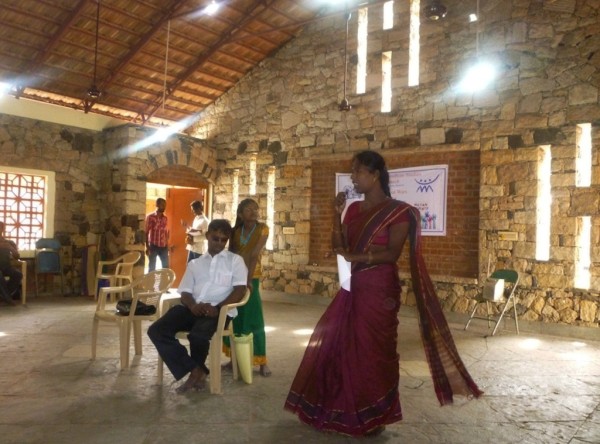International Human Rights Day 2013 was jointly celebrated by diverse groups in Madurai, the administrative headquarters of the district in the South Indian state of Tamil Nadu, on the Sunday previous to its actual December 10 official date. Activities took place at the Gandhian Museum and were organised by the Gandhian Studies and Research group and a local chapter of World Without Wars & Violence (WWW&V).
Guest attendees and speakers came from abroad and represented Silo’s Message, Jean Montane from France, and Anna Silva and Ismail, from Spain. A member of the international Humanist Movement was also present, from France, Jean Belle. He reminded the attendees that human rights are something still waiting in the future to be established.
Mr Belle was quoted in The Hindu newspaper saying: “If we awaken the non-violent and non-discriminatory sensibility it will grow and become universal. Peace, Force and Joy are the three pertinent forces that can bring about a change in society.”
Jean Montane told the Express News Service: “Silo’s Message intends to seek that people understand and realise the problems of the human psyche and explore opportunities for people to listen to their inner self. Our message is not in conflict with ideas and therefore people can follow our principles along with their religious practices.”
Speaker B. Aribabu, a faculty member of the American College, stressed the need to look into the Gandhian approach of non-violence to fight religious fundamentalism.
Students of this college played out a Tamil drama, Thiruppi kodu, as part of the day’s events which depicted the plight of students and showed the effects of the educational system’s central role of money, subsuming universal education, which affects all students across India, especially the poorer students. The drama co-ordinator was Mr. Anantha Kumar, WWW&V member.
Also playing a part in the event was a blind man, M. Pazhaniappan, who runs a school for the blind and is founder of the Agavizhi Trust for the Blind. He aired the view that a three-percent reservation of services of government be reserved for the sight impaired and otherwise disabled in the country.
Last but not least, Ms Swapna Karthick, who is called Beloved Sister Thirunangai (meaning transgender) who is fighting for her rights with both the government and society. Swapna, a transgender activist and representative, shared with the audience views of that particular sector’s sufferings due to a lack of human rights.
These two latter guests were in particular applauded for their courageous and motivating accounts of their situations and activities.
All-in-all a productive and – Pressenza is in formed – a wonderful day of exchange and communication garnering solidarity among all those diverse souls experiencing lacks in human rights amid the rapidly changing modern world.










